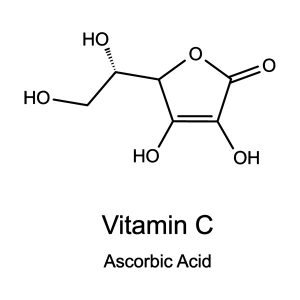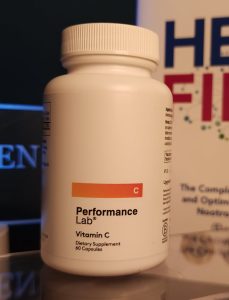Table of Contents
Vitamin C (ʟ-ascorbic acid or ascorbate) is an essential water-soluble vitamin.
Your body cannot produce Vitamin C on its own, so you must get it from foods high in this critical nutrient. Or take it as a supplement.
 Vitamin C is a potent antioxidant and required for protecting your cells from free radical damage. It helps with reducing infections and muscle tissue recovery.
Vitamin C is a potent antioxidant and required for protecting your cells from free radical damage. It helps with reducing infections and muscle tissue recovery.
Vitamin C is required for carnitine synthesis needed to convert fats into adenosine triphosphate (ATP) which is your master energy supply.
The retina in your eyes must be ‘bathed’ with Vitamin C both inside and out to function properly.[i] Vitamin C levels in your eyes are 100-times the concentration compared to the rest of your body.
In fact, when your body is deprived of Vitamin C, this vitamin stays in your brain longer than anywhere else in your body.
Scurvy is the result of severe Vitamin C deficiency. And one of the symptoms of scurvy is depression.
You need optimal levels of Vitamin C every single day for optimal brain health and function.
In this review, we take a deep dive into the nootropic benefits of Vitamin C. And why you should be supplementing with Vitamin C every day. OR eating a lot of oranges, grapefruit, and other foods high in Vitamin C.
As a nootropic, Vitamin C helps:
- Neuroprotection: Vitamin C is a potent antioxidant. It is an electron donor that reduces reactive oxygen species (ROS), and regenerates other antioxidants like Vitamin E already in your system.[ii] And helps reduce amyloid plaque and blood-brain barrier disruption protecting from Alzheimer’s Disease.[iii]
- Brain-Derived Neurotrophic Factor (BDNF): Vitamin C induces the expression of BDNF, a nerve growth factor required for neurogenesis. BNDF helps repair and grow new neurons, repairs synapses, and is used for long-term potentiation needed for long-term memory formation.[iv]
- Neuromodulator: Vitamin C supplies electrons for the dopamine-β-hydroxylase enzyme catalyzing the formation of norepinephrine from dopamine.[v] And induces the release of acetylcholine and norepinephrine from synaptic vesicles of neurons. Meaning Vitamin C is needed for brain cell signaling.[vi]
Overview
Vitamin C (Ascorbic acid) is a water-soluble vitamin. And unlike most mammals and other animals, humans do not have the ability to synthesize Vitamin C. And must get this critical vitamin from food or a supplement.
Doctors in Ancient Egypt first documented severe Vitamin C deficiency in Ebers Papyrus in 1550 BC.
Hippocrates coined ileos emantis for the disease and described the symptoms of this disease, “The mouth feels unpleasant; gums are separated from the teeth; blood flows from the nostrils… ulcerations appear on the legs; skin becomes thin.”
 James Lind, a surgeon in the 1770s in the British Royal Navy discovered that eating lemons and oranges helped reduce the symptoms of severe Vitamin C deficiency.
James Lind, a surgeon in the 1770s in the British Royal Navy discovered that eating lemons and oranges helped reduce the symptoms of severe Vitamin C deficiency.
Severe Vitamin C deficiency is known as scurvy. This disease was made famous by pirates and British sailors. Scurvy was likely responsible for many deaths during the Irish potato famine[vii], polar expeditions, the USA Civil War, and the California Gold Rush.[viii]
In the 1920s, Albert Szent-Györgyi, a Hungarian biochemist, discovered the molecular structure of Vitamin C and named it ascorbic acid meaning anti-scurvy. He was awarded the Nobel Prize in Physiology and Medicine in 1937 for his discovery of Vitamin C.[ix]
Unlike many other animals and vertebrae, humans can’t synthesize Vitamin C. That’s why it’s referred to as an “essential vitamin”. That means you must get enough Vitamin C every day from the food you eat, or a supplement.
Vitamin C is present in fresh, uncooked fruits and vegetables, especially citrus fruits and red and green peppers.
It’s also found in papayas, strawberries, broccoli, Brussels sprouts, tomatoes, asparagus and parsley. There’s no Vitamin C in animal food, and a small amount in raw fish.
Vitamin C plays a critical role throughout your body and brain. Levels of Vitamin C distributed throughout your body in order of amount higher to lower include your adrenal glands, pituitary gland, liver, spleen, kidneys, brain, heart, skeletal muscle, and skin.[x]
It improves the absorption of many other vitamins and minerals including iron.[xi]
Vitamin C is a powerful antioxidant that protects you at a cellular level. It keeps your cells healthy by preventing oxidative damage.
In your brain, Vitamin C helps convert dopamine into norepinephrine.
It also helps with neuron generation and creating and maintaining neural connections.
Adequate Vitamin C levels helps to elevate mood, reduce stress, improve learning and memory, and protect you from diseases like Alzheimer’s, Parkinson’s, Multiple Sclerosis among others.
Vitamin C deficiency can lead to scurvy. Although this is uncommon in the developed world, scurvy is still seen in at-risk groups like the elderly, smokers, and low-income families.[xii]
 How does Vitamin C work in the brain?
How does Vitamin C work in the brain?
Vitamin C boosts brain health and function in several ways. But two in particular stand out.
- Vitamin C for depression. Not enough Vitamin C can cause problems with enzymatic function and lead to insufficient production of collagen, carnitine, and the catecholamines (dopamine and norepinephrine).
Vitamin C modulates dopamine and glutamate neurotransmission. A study conducted in 2002 with young adults found 14-days of Vitamin C supplementation improved mood.
Other studies show supplementing with Vitamin C can potentiate the benefits of antidepressant medication. Researchers in Brazil concluded that Vitamin C (Ascorbic acid) supplementation seemed to benefit depression because of this vitamins’ action on serotonin, norepinephrine and dopamine systems in the brain.[xiii]
- Vitamin C for learning & memory. Vitamin C acts as a neuromodulator of glutamate, dopamine, acetylcholine and GABA And on the dopamine receptor which is involved in several brain processes including feelings of pleasure, reward, motor control, and memory.
Vitamin C supplies electrons for the enzyme dopamine-β-hydroxylase for the conversion of dopamine into norepinephrine. Dopamine receptor activation has been shown to cause the release of Vitamin C in the brain.
Vitamin C has also been shown to induce the release of acetylcholine (ACh) and norepinephrine from synaptic vesicles of neurons, linking Vitamin C to neuronal signal-transmission.[xiv]
An Australian clinical study in 2019 with 112 subjects ages 24 – 92 concluded, “we found a significant association between vitamin C concentrations and performance on tasks involving attention, focus, working memory, decision speed, both delayed and total recall, and recognition.”[xv]
How things go bad
Severe Vitamin C deficiency has been known for millennia as the potentially fatal disease called scurvy.
The symptoms of scurvy include:
↓ poor wound closure and bruising easily
↓ Neuroinflammation
↓ hair and tooth loss
↓ joint pain and swelling
↓ weakening of connective tissue and bone
↓ fatigue
↓ Memory loss
All of these symptoms can potentially be helped if you start eating foods high in Vitamin C or add a supplement to your nootropic stack.
Vitamin C Benefits
It’s evident that oxidative stress plays a huge role in Alzheimer’s Disease.
 The brains of people with Alzheimer’s disease contain lumps of amyloid plaques which consist of misfolded protein aggregates. They cause nerve cell death in the brain. And the first nerves to be attacked are the ones in the brain’s memory center.
The brains of people with Alzheimer’s disease contain lumps of amyloid plaques which consist of misfolded protein aggregates. They cause nerve cell death in the brain. And the first nerves to be attacked are the ones in the brain’s memory center.
Vitamin C is one of the most important antioxidants needed to decrease damage caused by free radicals.
It decreases amyloid β (Aβ) oligomerization, a major cause of neuronal toxicity in Alzheimer’s.[xvi]
Vitamin C plays a role in many other important functions in the brain, including reactive oxygen species scavenging, neuromodulation, and the development of new blood vessels (angiogenesis). [xvii]
Vitamin C mimics neurotransmitter systems in the brain and helps in transmitting signals throughout the central nervous system.
It also helps in the development of neurons through maturation, differentiation and myelin formation, and preventing neuron damage.[xviii]
How Does Vitamin C Feel?
Several neurohackers mentioned that after taking Vitamin C their brain fog lifted and they experienced better mood.
Some said they felt grounded, had more energy than usual, and in general felt optimistic through the day.
A lot of users said that their immunity increased, and they barely ever got a cold or the flu.
A few users even experienced positive side effects like stronger hair and nails, and better skin.
 Vitamin C Clinical Research
Vitamin C Clinical Research
Many studies have been conducted demonstrating Vitamin C’s effect on the brain. And how it can be used to prevent and treat mood related disorders, memory-loss and neurodegenerative disorders.
These cognition problems are a growing problem around the world. The thing is, by simply adding Vitamin C to your nootropic stack, or eating foods high in this vitamin, you could potentially avoid large medical bills and trips to the hospital.
Vitamin C for learning and memory
A double-blind, placebo controlled study conducted in 2021 with 214 young adults showed that Vitamin C supplementation promoted mental vitality and enhanced cognition and memory.[xix]
Another study with 80 healthy adults found that those with adequate blood levels of Vitamin C showed better performance in tests assessing memory, attention, reaction time, and focus than those with low Vitamin C levels. [xx]
Vitamin C Improves Mood and Lowers Rate of Depression
A study conducted in 2018 with 139 young men found that those with higher Vitamin C levels showed improved mood and lower rates of depression and confusion. [xxi]
Another recent study indicated that Vitamin C supplementation may improve mood in people with subclinical depression, which could enhance cognitive performance and reduce depression-related brain fog. [xxii]
Vitamin C reduced Anxiety
A 2015 study examined the effects of oral Vitamin C supplements in 42 high school students, in a randomized, double-blind, placebo-controlled trial. The students were given either Vitamin C (500 mg per day) or placebo.
Anxiety levels were evaluated for each student before and after 14 days following supplementation.
Results showed that Vitamin C reduced anxiety levels compared to the placebo.[xxiii]
Vitamin C Recommended Dosage
 The recommended nootropic dosage for Vitamin C is 250 mg 1 – 3-times per day.
The recommended nootropic dosage for Vitamin C is 250 mg 1 – 3-times per day.
Studies show Vitamin C doses above 500 mg per day improved blood flow in healthy volunteers.[xxiv]
The Nurses Health Study, premenopausal women with a family history of breast cancer who used an average of 205 mg/day of Vitamin C had a 63% lower risk of breast cancer.[xxv]
The tolerable upper limit for Vitamin C is 2000 mg for adult men and women.
Older adults have higher requirements for Vitamin C. Especially those at risk for chronic disease. There is some evidence that age reduces the efficiency of the mechanism needed for cellular uptake of Vitamin C.[xxvi]
The Linus Pauling Institute recommends a Vitamin C intake of 400 mg per day to ensure healthy tissue concentrations.[xxvii]
Vitamin C Side Effects
Vitamin C is non-toxic and safe to supplement every day.
There is no reliable scientific evidence that doses of Vitamin C up to 10 grams per day in adults are toxic or detrimental to health.
Oxalate is a metabolite of Vitamin C. So there is some concern that higher dosages of Vitamin C may increase the risk of kidney stones.[xxviii]
Vitamin C dosages of 2000 mg per day or more can lead to gastrointestinal problems like diarrhea and nausea.
More than 1,000 mg Vitamin C per day may decrease the effectiveness of anticoagulation medications.
Vitamin C can also bind to aluminum (i.e. antacids) in the gut and increase aluminum absorption. Which can be toxic in those with impaired kidney function.
Vitamin C may increase or decrease the effectiveness of chemotherapy medications. So check with your oncologist before using Vitamin C.
Vitamin C may increase blood estrogen in women using oral contraceptives or who are using hormone replacement therapy.
Overdosing on Vitamin C can also lead to over-accumulation of iron in your body (since Vitamin C increases iron absorption).
Type of Vitamin C to Buy
Vitamin C (L-ascorbic acid) is available in many forms. But there is no scientific evidence that one form is absorbed or more effective than another.
 Vitamin C with flavonoids – human clinical studies have found no bioavailability differences when Vitamin C is combined with flavonoids.
Vitamin C with flavonoids – human clinical studies have found no bioavailability differences when Vitamin C is combined with flavonoids.
Buffered Vitamin C – mineral salts of Vitamin C are less acidic than regular Vitamin C so should be less irritating to your gut. Just be aware of the ratio of sodium ascorbate to ascorbic acid so you know how much Vitamin C you are using.
Ester-C® – is mostly calcium ascorbate but includes small amounts of Vitamin C. One public study showed no difference between Ester-C® and regular Vitamin C in absorption or urinary excretion.[xxix]
Natural vs Synthetic Vitamin C – studies have shown that there are no known differences in efficacy or bioavailability between these two forms of Vitamin C.[xxx]
Liposomal Vitamin C – PureWay-C® and Lypo-spheric™ are two forms of liposomal Vitamin C and licensed to supplement manufacturers. Studies show the liposomal form of Vitamin C may reduce inflammation and oxidative stress better than regular ascorbic acid (Vitamin C).[xxxi]
Performance Lab® Vitamin C (NutriGenesis®) – NutriGenesis® technology is based on the Nobel Prize-winning research of Hungarian biochemist Albert Szent-Györgyi (same guy who discovered Vitamin C). He showed naturally grown forms of nutrients like Vitamin C are more bioavailable than other forms of the same nutrient.
Nootropics Expert® Recommendation
 Vitamin C 250 mg 2 – 3-times per day
Vitamin C 250 mg 2 – 3-times per day
I recommend Vitamin C as a nootropic supplement.
Your body does not make Vitamin C on its own. So you must get it from foods high in Vitamin C or take it as a supplement.
Supplementing with Vitamin C should help reduce brain fog. And put you in a better mood.
Neurohackers, report they felt more grounded after adding Vitamin C to their stack. They had more energy than usual, and in general felt optimistic through the day.
A lot of users said that their immunity increased, and they didn’t get a cold or the flu as often after starting with Vitamin C.
You should also have stronger hair and nails, and better and younger looking skin.
Vitamin C is especially helpful for avoiding Alzheimer’s Disease because it helps break up clumps of Amyloid-β that blocks brain blood flow.
I recommend and use: Performance Lab® Vitamin C (NutriGenesis®)






Join The Discussion - 5 comments
David Törner
November 12, 2025
what’s the worlds best absorbable form and product I can buy atm for vitamin c? I’m serious about biohacking
David Tomen
November 13, 2025
David, the most absorbable form is liposomal Vitamin C because it seems to get into cells easier. Or the Performance lab Vitamin C I link to above in the type to buy section but it’s out of stock right now. That form is the very same form that biochemist Albert Szent-Györgyi (same guy who discovered Vitamin C) developed years ago. They call it NutriGenesis.
Matej Kudlak
December 4, 2024
Hello David, thank you for your immense work on this website, it is a great source of information, it helped me to fix my low quality sleep.
I would like to highlight one important thing in regards to Vitamin C that I am aware of, which is that no matter how much Vitamin C you eat, if your diet is very high in sugar, you will experience the same problems as if you were Vitamin C deficient. High glucose levels inhibit Vitamin C from entering our cells, decreasing absorption. Glucose and Ascorbic acid are closely related and have similar chemical structures. They compete for glucose transporters, hyperglycemia will exclude Vitamin C from the cell and result in a decreased antioxidant capacity. That’s why individuals who reduce their sugar intake experience significant improvement in Vitamin C levels and it’s benefits.
Warren Young
November 7, 2024
Hello Mr. Tomen. My name is Warren Young. Your website has helped me a lot. Because of the knowledge you have bestowed onto me, I’ll like to help you out with something in your Vitamin C post. You claimed animal products do not have vitamin c. But that’s not true. There is small amounts of vitamin c in organ meat, and fish roe.
David Tomen
November 8, 2024
Warren, the Vitamin C dose in those types of meat are not nearly high enough to provide the amount of Vitamin C we need every day.